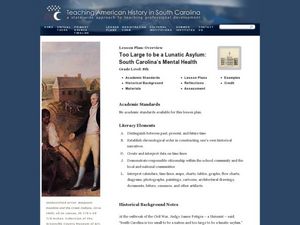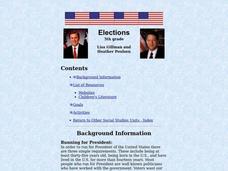Curated OER
What Was It Like?
Students use the Internet to gather historical facts about the county in which they live. Using the information, they discover how to check it for accuracy and present their findings to the class. They write an essay about the history of...
Curated OER
Federalism and the Prevention of Abuse of Power in the US Federal Government
Fourth graders stud Federalism and identify examples of abuse of power.
Curated OER
Why A Bill of Rights?
Examine conflicting viewpoints in this lesson plan, in which middle schoolers write their own proposal for including a Bill of Rights in the Constitution. As a class, they discover how the Bill of Rights was not a planned document to be...
Mr. Nussbaum
Thomas Jefferson Reading Comprehension
Discover a little bit about Thomas Jefferson in a brief reading passage. Learners then answer a set of multiple choice comprehension questions.
Carolina K-12
Preventing Voter Fraud or Encouraging Voter Suppression?
The issues of voter fraud and voter suppression are relevant in every election, local as well as national. Soon-to-be voters learn about a recent bill proposed in North Carolina, the Voter Information and Verification Act, and...
Curated OER
Analyzing Public Policy Opinions
Students brainstorm a list of the major issues affecting Fairfax County, Virginia. Using the internet, they choose one topic to research in depth. To end the lesson, they analyze the effectiveness of an actual public policy proposal or...
Curated OER
Issues Close to Home
Pupils discuss their role in their local government. Individually, they use various types of media to examine and take a position on a topic important to them. To introduce their position, they write a letter to the Board of...
Curated OER
Issues Close to Home
Students brainstorm as a class about their role in the local government. In groups, they use various types of media to discover how it is affecting their lives. They choose one issue and state their position to share with the class. To...
Curated OER
Understanding Dillon's Rule
Students review the establishment of the local government in Virginia. Using a reading assignment, they gather information on Dillon's rule and how it changed the government in the state. To end the lesson, they share their reflections...
Curated OER
Native Americans
Students choose two photographs and explain how they illustrate traditional Native American culture. They discuss how traditional Native American culture has been affected by two specific actions of the United States Government, (they...
Curated OER
Too Large to be a Lunatic Asylum: South Carolina’s Mental Health
Eighth graders examine the history of South Carolina's mental institutions. In this South Carolina history lesson, 8th graders discover details about asylums built in the state in the 1800's. Students analyze primary sources about mental...
Curated OER
Oral History of World War II
Students research how citizens from the United States respond to the onset, duration and aftermath of World War II. They view clips from the movie "Swing Shift" and discuss the roles of civilians, minorities and military personnel. They...
Curated OER
People And Places To Know
In this social studies worksheet, students learn pertinent facts about where they live (city, state, country) and who governs them (mayor, governor, president.) Students write their answers on the cards which could be cut apart and used...
Curated OER
What's The Plan?
Students identify how the human activities in the state of Maryland have changed/ evolved over the last 50 years. They evaluate a land planning document and prepare a fictitious planning document for a given area of land.
Curated OER
Influencing the Agenda: The Impact of Interest Groups on Policy Making
Middle schoolers examine the role of interest groups and how they affect voters. In groups, they research how the groups have affected policy making in the county. They examine a specific issue and discover whether or not a vote was...
Curated OER
Is it Legal? - The Judicial System
Fourth graders explore the judicial branch of government; in particular, Florida's judicial branch of government.
Curated OER
Who are American Citizens?
Students investigate American citizenship. For this civics lesson, students consider the basic knowledge of U. S. government new citizens are required to have. Students also examine the 14th amendment that describes U. S. citizenship.
Curated OER
Our Country's People Crossword Puzzle
In this US citizens worksheet, students complete a crossword puzzle by answering 19 clues. They use words from a word bank at the bottom of the puzzle, which includes ancestor, citizen, government, president, and immigrant.
Curated OER
Geography and Artifacts of Mexico
Students review the structure of government in Mexico and discuss how it is different than the United States. Using artifacts, they must label and identify the city or state in which the artifact originated. They use the artifact clues...
Curated OER
Vote for Me!
Tenth graders analyze voter trends in South Carolina and discover techniques canddidates and their parties use to convince us to vote their way. They are able to locate voting statistics for their county; compare the number of...
Curated OER
The Economics of Organic Agriculture
Students examine how organic agriculture affects farm profitability and how government programs affect organic agriculture. In this organic agriculture lesson students complete an activity on costs and returns.
Curated OER
Lewis and Clark Expedition
Fourth graders read excerpts and research the Internet to learn about the expeditions of Lewis and Clark and their impact on the United States. Students fill out a KWL chart as they learn.
Curated OER
Utah's Legislative Branch: How a Bill Becomes a Law
Seventh graders discover how a bill becomes a law in Utah. In groups, they decide on a law they would like to see enacted and discuss its chances of being passed by the legislative branch in Utah. They hold elections in which each...
Curated OER
Elections
Fifth graders examine the voting process, the electoral college and the voting process. They identify qualities important to a president. They fill out ballot sheets and study the registration forms.























